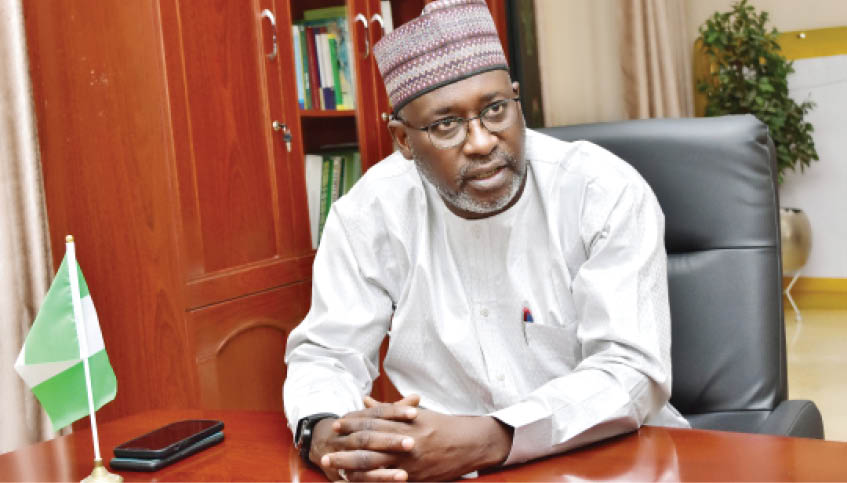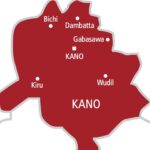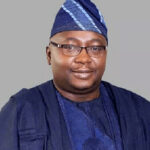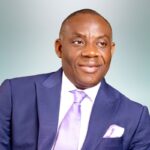As Nigeria joins the world today to mark this year’s Water Day, the Minister of Water Resources, Engr. Suleiman Adam, in this interview, explained why many households, especially in the rural communities, don’t have access to potable water and what must be done to address the challenges.
By Stella Iyaji , Hussein Yahaya and Seun Adeuyi
Honourable minister, when you came on board, you had a policy of completing existing projects of the ministry instead of embarking on new ones. We would like to know how far you have gone on this.
Thank you very much. We have been trying our best but the situation still stays the same. We’re still working on inherited projects; projects that we met that were ongoing or abandoned, but which have a potentially positive impact on the people. So we’re still working on them. We’ve not embarked on anything new up till now.
Driver, others escape as vehicle bursts into flames in Abuja
Kano man remanded for stealing seasoning cubes
Right now, I think we have finished about 34. Actually, we inherited 116 projects. We did a technical audit, some projects were cancelled because we realized they were not viable.
Some projects were handed over to the state governments because we felt they will be better in handling them and the rest we put into priority 1, 2, 3 or high medium or low priority.
And based on that, we took the high and medium priority projects, and they came to about 75 or so. So, those are the ones that we have been working on. In the last few years, we have finished about 34 but for the COVID pandemic, I’m sure we would have finished much more. But we are reprioritising again and our target now is to finish an additional nine so that by the time we leave office in 2023, we would have had a total of about 45 or so which is well past the halfway mark. So that’s the whole idea, but obviously, we know that we can’t finish all of them.
But mark you, it’s not that we’ve not been doing new projects. They’ve been smaller projects, like our programme for the IDPs and the North East intervention in water supply and sanitation. We do quite a number of projects there. But any major project that you see us working on is basically a project that we inherited and we feel that we have an obligation to complete it.
You will agree with me that many households in Nigeria still don’t have access to potable water. How has the ministry fared in terms of collaborating with the other tiers of government to help address this challenge?
Well, again, I like to say this, Nigerians need to understand that it is not the responsibility of the federal government to provide water to people in their houses. It is the responsibility of the state governments to do that, and local governments going down further. That is why this ministry does not have a water board.
The only federal water board that we have is the one that is managed by the Federal Capital Territory Administration. And that, of course, is for the Federal Capital Territory. So it’s not under the municipal taxes.
So, every time people ask me that there is no water in their towns. I tell them, go and ask your states. In the last four decades or so, the federal government has built over 400 dams, I think. We just launched the compendium on dams last year across the country. There are over 500 dams that have been captured.
Almost 400 of them were built by the federal government and that’s the role that we play; we provide bulk water; we go and build the dams. And it is for the states to now tap into that water, treat it and distribute. That’s the way it is supposed to be.
What we have today are the schemes that were built like 40 years ago. They are the only ones that are running up till now. In the last few years or several years, states have stopped investing in especially urban water supply. So the few urban water schemes that are existing, population has more than doubled and therefore, cannot meet the demand of the people. And then to make it worse, these water schemes are not being operated and maintained as they should be. Our population is increasing and we are not investing in water schemes to match the increase in population, rather, even the schemes that you already have, you are not operating them optimally. So again, you are losing and causing a lot of additional demand. So that’s what’s been going on.
So what have we been doing? When we came into office, the first question I asked was how come we didn’t meet the 75% coverage recommended under the Millennium Development Goals. We realized that it’s because state governments have always relied on budgets. They have not taken a proper step by saying, I’m going to prioritize water and invest a lot of money in water. And if we are to continue to go by budgetary allocation, we’ll never get there.
So, the federal government came up with two things; we established the PEWASH programme (Partnership for Expanding Water, Sanitation, Hygiene) to support state governments’ efforts in meeting the rural demand.
It is a programme to incentivize the states to invest more in water and sanitation. And to that extent, we now said the federal government will put in 50% to support the rural scheme only if the state agrees to put 50%.
There are so many schemes that have been going on that we inherited’ the Zobi water supply that was started in 1992 and was never finished until we finished it and commissioned it in 2021. Zungeru-Wushishi, also since 1998 or so, we’re working on it now.
We restructured the financing with the states to make their own contributions. So, all of these have been ongoing.
Then finally, in the proposed Water Resources bill. We also created a WASHfund (Water, sanitation and hygiene fund). We made a provision for that so that states that are really looking for funding can go and take money from that fund. The structure of the fund is being worked out. In fact, we finished the first draft but without the law in place the fund cannot operate.
So that’s another way we want to support the state to get additional funding to do what they need to do in terms of the provision of water supply.
Can you tell us how many states have keyed into this PWASH programme?
We started with two pilot projects, then we got 10 and two came in, and now we’ve just awarded the contract for five more states. That’s about 17 states out of 36. The plan is that at the initial takeoff, each state will give us two local governments that have the highest demand for water, highest need for water; those that are really, really deprived. They will do two local governments, and the federal government will do two local governments. But we’re looking at the rural communities, not urban towns in the local governments.
When you came in you introduced the Water, Sanitation and Hygiene (WASH) programme, as part of efforts to promote good hygiene among Nigerians. This led to the declaration of a state of emergency on sanitation by Mr President. How do you rate the policy so far?
Well, the PEWASH programme that I mentioned earlier is part of it. The campaign against open defecation is part of it. We have 76 local governments now that are open defecation free from only one in 2017. I’m not celebrating because I think we should have done more by now. I think part of the problem was COVID. But then, also, I think the whole campaign gained traction initially, but some states have really slowed down. But we’re working very hard for the national clean campaign secretariat to up the ante.
So these are some of the things, but again, I know many states also declared a state of emergency but they have not followed their intent with actions. We’re making a lot of progress on ODF in two states, Katsina and Jigawa. I think very soon, hopefully before the end of this year, we’ll be celebrating the first state that is open defecation free. That’s what we’re working on. It can either be Katsina or Jigawa.
The idea is also to make it be an impetus to other states to see that it is doable so that they can also key in and step up their efforts in that regard.
You also took up the campaign on the need for the country to end open defecation by 2025. Is the target still realistic?
Well, the UN target is 2030 but we have to set a target that will ginger us. I still think it is possible, the rate at which Jigawa and Katsina states have been churning out open defecation free local governments has been amazing. No African country has declared a state of emergency. To create a clean Nigeria campaign secretariat, for the president to put up an executive order and now again it’s been followed with legislation with the National Assembly, I think at the federal level we have demonstrated everything that needs to be demonstrated.
People must understand that this campaign is not a government thing, it is about your individual self. You go into the bush in the night, you get snake bites and so on and so forth, even as a man, to urinate on the street is not dignifying. You don’t see that happening in other parts of the world.
Every year we join the world to mark the water day on March 20. To what extent have relevant stakeholders, especially state governments, been drawing lessons from the activities and how have they been using the messages for the good of their citizens?
Well, I’m sure a lot of people do. But the problem is that people think it’s just government agencies and NGOs that basically observe these days. But in any case, we need to keep hammering on these things. With time, people will know and understand the messages therein. At least in every celebration, you win some new converts. We bring in children, we commemorate with them, we teach them hand washing and so on and so forth. And they’re grabbing it.
So, it might take a few years to get this in the way we would have wanted but it is not a lost battle. I think that sooner or later, as people become more educated and more aware, they will understand the virtue of sanitation.
On this particular world water day, what one message would you want Nigerians to think about?
Respect water and sanitation.
By next year, you will be rounding off your second tenure as Minister of Water Resources. Can you tell us some of the major projects you want people to remember you by?
I know the kinds of projects I would like to be remembered for are yet to take off. For instance, the HAUWAL inter-basin transfer and hopefully I would like to see some of the major irrigation projects finished, like the TRIM programme. I’d like to see the Sokoto irrigation project finished. We have entered into MOUs and involved in PPP basis to develop more hydropower schemes. I’d like to see a few of those in all of these hydro schemes put in place and implemented.
But much more important than that, I would like to see the Federal Ministry of Water Resources transformed to the proper professional ministry that it should be; a ministry where projects are being implemented strictly based on professional guidelines and delivered professionally. That’s what I want to see.

 Join Daily Trust WhatsApp Community For Quick Access To News and Happenings Around You.
Join Daily Trust WhatsApp Community For Quick Access To News and Happenings Around You.

